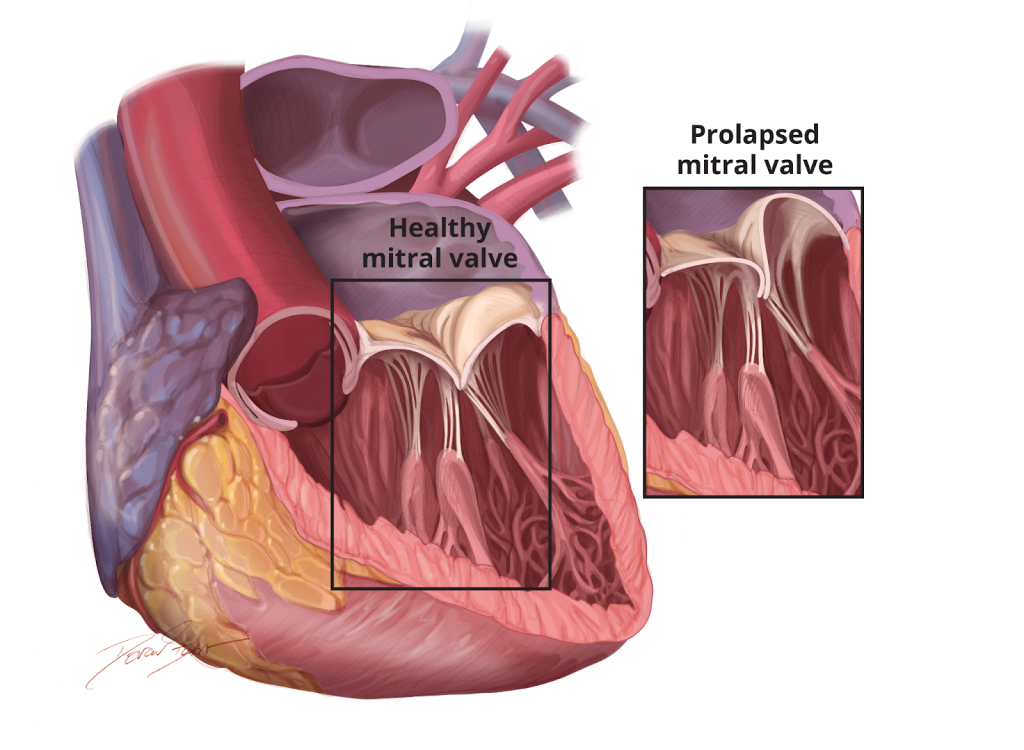
Mitral regurgitation (MR), also known as mitral valve regurgitation or mitral insufficiency, is a condition characterized by the leakage of blood backward through the mitral valve into the left atrium of the heart during the ventricular contraction phase of the cardiac cycle. This leakage occurs when the mitral valve does not close properly, allowing blood to flow backward into the left atrium instead of being pumped forward into the left ventricle and out to the body.
Causes and Types
Mitral regurgitation can be classified into two main types based on its cause:
- Primary (organic) mitral regurgitation: This occurs when there is a structural abnormality or dysfunction of the mitral valve itself. Causes may include:
– Mitral valve prolapse (MVP): A condition in which the leaflets of the mitral valve bulge (prolapse) into the left atrium during systole.
– Mitral valve degeneration: Age-related changes in the mitral valve leaflets, such as thickening, calcification, or tearing.
– Rheumatic heart disease: Damage to the mitral valve due to rheumatic fever, an inflammatory condition caused by untreated streptococcal infections.
– Infective endocarditis: Infection of the mitral valve, often resulting from bacteria entering the bloodstream and adhering to the valve surface.
– Congenital heart defects: Abnormalities present at birth that affect the structure or function of the mitral valve.
- Secondary (functional) mitral regurgitation: This occurs as a result of dysfunction or dilation of the left ventricle, which affects the function of the mitral valve apparatus. Causes may include:
– Ischemic heart disease: Reduced blood flow to the heart muscle due to coronary artery disease, leading to left ventricular dysfunction and remodeling.
– Dilated cardiomyopathy: Weakening and enlargement of the left ventricle, often of unknown cause.
– Hypertrophic cardiomyopathy: Abnormal thickening of the heart muscle, particularly the left ventricle, leading to impaired relaxation and filling.
– Left ventricular aneurysm: Abnormal bulging or outpouching of the left ventricular wall, often occurring after a myocardial infarction (heart attack).
Symptoms
The symptoms of mitral regurgitation can vary depending on the severity of the condition and whether it develops gradually or suddenly. Common symptoms may include:
– Fatigue
– Shortness of breath, especially with exertion or when lying flat (orthopnea)
– Palpitations or irregular heartbeats
– Swelling of the ankles, feet, or abdomen (edema)
– Difficulty breathing when lying flat (paroxysmal nocturnal dyspnea)
– Reduced exercise tolerance
– Chest discomfort or pain, particularly with exertion
Diagnosis:
Diagnosis of mitral regurgitation may involve a combination of medical history, physical examination, laboratory tests (including blood tests and cardiac biomarkers), imaging tests (such as echocardiography, transesophageal echocardiography [TEE], cardiac MRI, or cardiac CT scan), and cardiac catheterization.
Treatment:
Treatment for mitral regurgitation aims to relieve symptoms, improve heart function, and reduce the risk of complications. Treatment options may include:
– Medications: Medications to manage symptoms (such as diuretics for fluid retention), improve heart function (such as ACE inhibitors or beta-blockers), and prevent complications (such as anticoagulants to reduce the risk of blood clots).
– Surgery: Surgical interventions may be necessary to repair or replace the mitral valve in cases of severe or symptomatic mitral regurgitation. Surgical options may include mitral valve repair (which preserves the patient’s own valve tissue) or mitral valve replacement (which involves replacing the diseased valve with a mechanical or bioprosthetic valve).
– Transcatheter interventions: Minimally invasive procedures, such as transcatheter mitral valve repair (e.g., using the MitraClip device) or transcatheter mitral valve replacement, may be options for select patients who are not candidates for traditional surgery.
